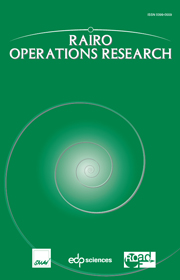Article contents
A study of the dynamic of influence through differentialequations∗
Published online by Cambridge University Press: 15 May 2012
Abstract
The paper concerns a model of influence in which agents make their decisions on a certainissue. We assume that each agent is inclined to make a particular decision, but due to apossible influence of the others, his final decision may be different from his initialinclination. Since in reality the influence does not necessarily stop after one step, butmay iterate, we present a model which allows us to study the dynamic of influence. Aninnovative and important element of the model with respect to other studies of thisinfluence framework is the introduction of weights reflecting the importance that oneagent gives to the others. These importance weights can be positive, negative or equal tozero, which corresponds to the stimulation of the agent by the ‘weighted’ one, theinhibition, or the absence of relation between the two agents in question, respectively.The exhortation obtained by an agent is defined by the weighted sum of the opinionsreceived by all agents, and the updating rule is based on the sign of the exhortation. Theuse of continuous variables permits the application of differential equations systems tothe analysis of the convergence of agents’ decisions in long-time. We study the dynamic ofsome influence functions introduced originally in the discrete model,e.g., the majority and guru influence functions, but the approachallows the study of new concepts, like e.g. the weighted majorityfunction. In the dynamic framework, we describe necessary and sufficient conditions for anagent to be follower of a coalition, and for a set to be the boss set or the approval setof an agent. equations to the influence model, we recover the results of the discretemodel on on the boss and approval sets for the command games equivalent to some influencefunctions.
- Type
- Research Article
- Information
- Copyright
- © EDP Sciences, ROADEF, SMAI, 2012
References
- 2
- Cited by


